The Olympic Games 1896 Athens
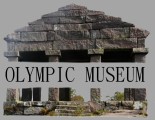

Then there were nocturnal festivities on the Acropolis, where the Parthenon was illuminated with colored lights, and at the Piraus, where the vessels were hung with Japanese lanterns. Unluckily, the weather changed, and the sea was so high on the day appointed for the boat-races, which were to have taken place in the roadstead of Phalerum, that the project was abandoned. The distribution of prizes was likewise postponed for twenty-four hours. It came off with much solemnity, on the morning of April 15, in the Stadion. The sun shone again, and sparkled on the officers' uniforms. When the roll of the victors was called, it became evident, after all, that the international character of the institution was well guarded by the results of the contests. America had won nine prizes for athletic sports alone (flat races for 100 and 400 meters; 110-meter hurdle-race; high jump; broad jump; pole-vault; hop, step, and jump; putting the shot; throwing the discus), and two prizes for shooting (revolver, 25 and 30 meters); but France had the prizes for foil-fencing and for four bicycle-races; England scored highest in the one-handed weight-lifting contest, and in single lawn-tennis; Greece won the run from Marathon, two gymnastic contests (rings, climbing the smooth rope), three prizes for shooting (carbine, 200 and 300 meters; pistol, 25 meters), a prize for fencing with sabers, and a bicycle-race; Germany won in wrestling, in gymnastics (parallel bars, fixed bar, horse-leaping), and in double lawn-tennis; Australia, the 800-meter and 1500-meter foot-races on the flat; Hungary, swimming-matches of 100 and 1200 meters; Austria, the 500-meter swimming-match and the 12-hour bicycle race; Switzerland, a gymnastic prize; Denmark, the two-handed weight-lifting contest.
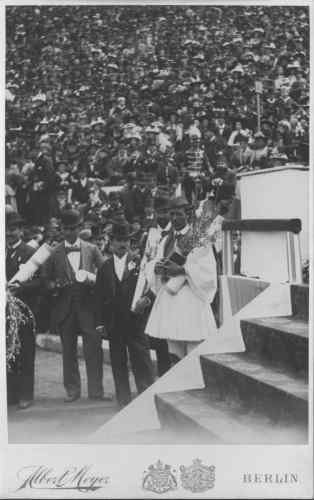
All the morning papers on this day were full of the accounts of the
preceeding day; they exulted over the victory won by their countryman and
extolled the victor. Every paper published an account of his life and his
portrait; reproductions of which in lithography, photography or xylography
were exposed and sold in every shop window. Some shops even went so far
as to adopt his name as an ensign. The victorious Louis himself was overwhelmed
with attentions. Congratulating telegrams came from every part of the world,
amongst the more substantial gifts he received, we may mention a field,
presented to him by Greek residents in England, which was from henceforth
to be called: Field of Marathon.
Louis, the hero of the day, a young man 25 years old, has a most
prepossessing appearance. He is the offspring of a poor, but honest family,
of many children. When he was serving his term in the first infantry regiment
he became noted for capability in enduring long marches. The quickness
with which he ran, made him famous amongst his companions and one of his
former officers, M. Papadiamantopoulos, one of the members of the Committee
persuaded him therefore to enter his name as a competitor for the Marathon
Cup. It is worthy of note that the pious peasant had gone to confession
and taken the Holy Communion the day before the race. The programme of
that day was again made up by games of various attractions. In the morning
the wrestling match was continued; although the entrance to the Stadion
was free, few people comparatively assembled there. The Marathon race being
over, the games had lost much of their attractions.
Source document: Official Report 1896
The prizes were an olive branch from the very spot, at Olympia, where stood the ancient Altos, a diploma drawn by a Greek artist, and a silver medal chiseled by the celebrated French engraver Chaplain. On one side of the medal is the Acropolis, with the Parthenon and the Propels; on the other a colossal head of the Olympian Zeus, after the type created by Ophidians. The head of the god is blurred, as if by distance and the lapse of centuries, while in the foreground, in clear relief, is the Victory which Zeus holds on his hand. It is a striking and original conception. After the distribution of the prizes, the athletes formed for the traditional procession around the Stadion. Loue's, the victor of Marathon, came first, bearing the Greek flag; then the Americans, the Hungarians, the French, the Germans. The ceremony, moreover, was made more memorable by a charming incident. One of the contestants, Mr. Robertson, an Oxford student, recited an ode which he had composed, in ancient Greek and in the Pindaric mode, in honor of the games. Music had opened them, and Poetry was present at their close; and thus was the bond once more renewed which in the past united the Muses with feats of physical strength, the mind with the well-trained body. The king announced that the first Olympiad was at an end, and left the Stadion, the band playing the Greek national hymn, and the crowd cheering. A few days later Athens was emptied of its guests. Torn wreaths littered the public squares; the banners which had floated merrily in the streets disappeared; the sun and the wind held sole possession of the marble sidewalks of Stadion street.
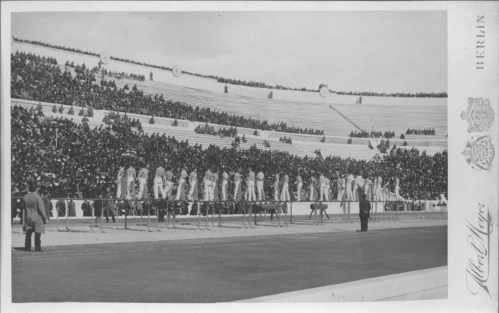
Exercise on Parallel Bars
Three teams were inscribed for this contest, that of the National
Association of Athens, that of the Panhellenian Association, and the German
team. The Greek teams comprised a larger number of champions, and we cannot
help praising the gracefulness and agility which were remarked in everyone.
The applause of their countrymen was showered on them after each exercise.
The first team was under the command of Mr Chrysaphis, the second under
that of Mr Athanasopoulos, the German as well as the Greek teams showed
in their attire their national colours the Greeks wore light blue and white,
the Germans black and white. The Germans carried off the first prize, having
gone through their difficult exercises with a precision and regularity
that everybody recognised the superior training they had received. The
admiration of the crowd showed itself in loud cheering for the first time
since the beginning of the festival the German flag was hoisted and saluted
with respect.
Source document: Official Report 1896
It is interesting to ask oneself what are likely to be the results of the Olympic games of 1896, as regards both Greece and the rest of the world. In the case of Greece, the games will be found to have had a double effect, one athletic, the other political. It is a well-known fact that the Greeks had lost completely, during their centuries of oppression, the taste for physical sports. There were good walkers among the mountaineers, and good swimmers in the scattered villages along the coast. It was a matter of pride with the young palikar to wrestle and to dance well, but that was because bravery and a gallant bearing were admired by those about him. Greek dances are far from athletic, and the wrestling-matches of peasants have none of the characteristics of true sports. The men of the towns had come to. know no diversion beyond reading the newspapers, and violently discussing politics about the tables of the cafes. The Greek race, however, is free from the natural indolence of the Oriental, and it was manifest that the athletic habit would, if the opportunity offered, easily take root again among its men.
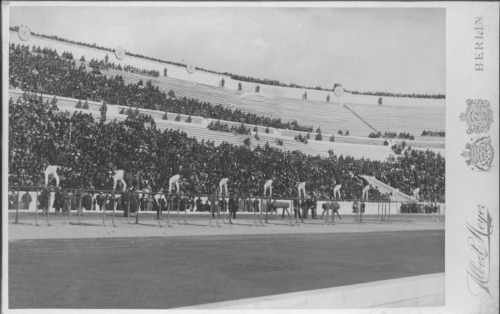
Indeed, several gymnastic associations had been formed in recent years at Athens and Patras, and a rowing-club at Piraeus, and the public was showing a growing interest in their feats. It was therefore a favorable moment to speak the words, "Olympic games.» No sooner had it been made clear that Athens was to aid in the revival of the Olympiads than a perfect fever of muscular activity broke out all over the kingdom. And this was nothing to what followed the games. I have seen, in little villages far from the capital, small boys, scarcely out of long clothes, throwing big stones, or jumping improvised hurdles, and two urchins never met in the streets of Athens without running races.
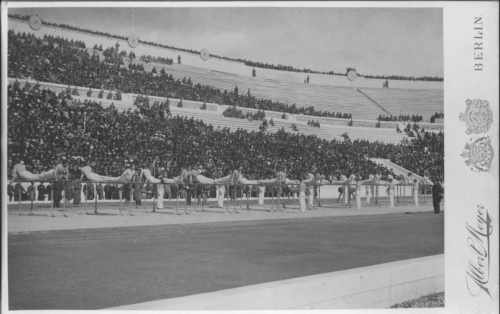
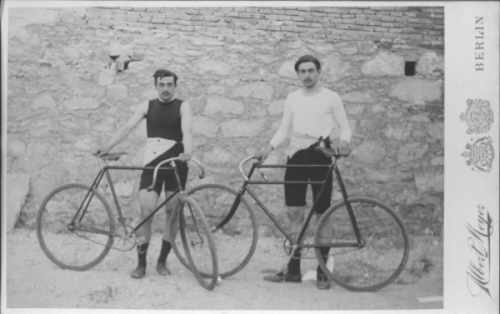
Race of 2 Kilometres.
In this contest four competitors took part, one Greek, Mr Nicolopoulos,
amongst them. They had to make the circuit of the track 6 times. All started
of course at the same moment, Mr Rosemayer, a German kept for a short time
ahead of the other cyclists, but unfortunately he broke down and had to
retire from the track. The three other competitors, Mr Flamand and Mr Masson,
2 Frenchmen, and Mr Nicolopoulos continued the race in which Mr Masson
was victorious. He had cycled the distance in 4 minutes, 58 1/ 5 seconds.
Mr Nicolopoulos came in second, he had taken 5 minutes 1/5 second for cycling
6 times round the track. The French flag was immediately hoisted and greeted
with frantic cheers.
Race of 10 Kilometres.
Six competitors took part in this contest, Mr Schmall, an Austrian,
Mr Masson, Mr Flamand, two Greeks, Mr Colettis and Mr Constantinidhis and
Mr Rosemayer. The competitors had to make 30 times the circuit of the track.
They started at the given signal, but quite at the beginning of the race
the bicycles of the two Greek champions came into collision. Both gentlemen
fell down, and unfortunately Mr Colettis hurt his arm in the fall, so that
he had to give up the contest. Mr Massen was again victorious, having cycled
the distance of 10 kilometres in 17' 54'' 1/5.
Source document: Official Report 1896